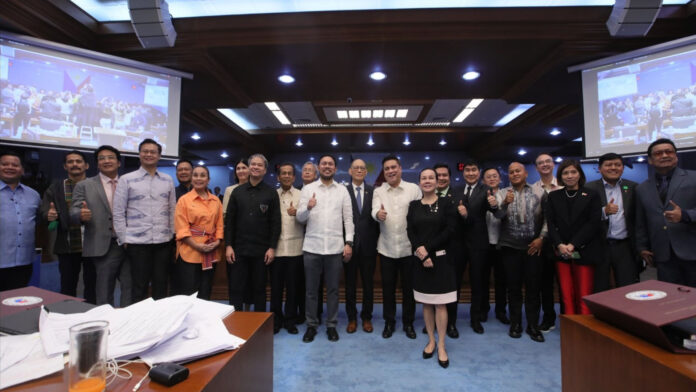The Senate approved at exactly 2 a.m. on Wednesday Senate Bill (SB) 2020, or the Maharlika Investment Fund (MIF) Bill, with a total of 19 affirmative votes, one negative and one abstention.
This, after the measure went under marathon of amendments in the plenary after Senate Minority Leader Aquilino Pimentel III raised some concerns in his turno en contra speech on Tuesday afternoon, saying the measure was “unjustified and unneeded”.
Sponsored by Senator Mark Villar, the MIF seeks to establish the Maharlika Investment Corporation (MIC), which “shall act as the sole vehicle for the purpose of mobilizing and utilizing the MIF for investments in transactions in order to generate optimal returns on investments (ROIs).”
It is also expected to contribute to the overall goal of the government to reinvigorate job creation and accelerate poverty reduction by sustaining the country’s economic growth.
During the interpellations, Villar cited numerous benefits that the country will attain once the MIF bill is passed into law.
“We have carefully studied and analyzed the MIF bill. We made revisions and added more safeguards to ensure that the version will benefit the Filipino people,” he said.
Villar said the proposed measure has a lot of benefits and among these are the job opportunities that will be created through the infrastructure projects that the fund will help finance.
He said the measure will help “promote economic growth since better infrastructure leads to more efficient transportation, communication, and other systems.”
“Also, this will be a vehicle to reduce poverty, this would help the government manage its budget and mitigate fiscal pressures during economic downturns as it acts as a safety net for the country,” he explained.
Villar said the MIF may be used to invest in infrastructures for the agriculture and energy sectors, among others.
“This is what the Maharlika is there for — it’s to generate jobs and generate investments in the sectors that lack investment,” he said.
Certified as “urgent” by President Ferdinand R. Marcos Jr., the MIF is a sovereign wealth fund that will be used to invest in a wide range of assets, including foreign currencies, fixed-income instruments, domestic and foreign corporate bonds, commercial real estate, and infrastructure projects. The fund is expected to generate income for the government and help promote economic development.
Under SB 2020, the MIC shall have its principle place of business in Metro Manila, but may maintain branches and agencies in other areas within and outside the country.
It shall have an authorized capital stock of PHP500 billion, with common shares of PHP3.75 billion, to be subscribed by the national government, its agencies or instrumentalities, including government-owned and controlled corporations (GOCCs) or government financial institutions (GFIs) except Social Security System (SSS), Government Service Insurance System (GSIS), Philippine Health Insurance Corporation (PhilHealth), Home Development Mutual Fund or Pag-IBIG Fund, Overseas Workers Welfare Administration (OWWA), and the Philippine Veterans Affairs Office (PVAO).
Landbank of the Philippines (Landbank), Development Bank of the Philippines (DBP), and the national government will each contribute PHP50 billion to the fund.
The MIF bill was immediately discussed by senators and members of the House of Representatives by convening a bicameral conference on Wednesday to reconcile the differences between the Senate and House of Representatives’ versions of the measure.
Filipino translation
During the period of amendments of the measure early Wednesday, Senator Robinhood Padilla cited the need to make documents relating to MIF and MIC be translated into Filipino language and be made available and accessible to the public to allow ordinary Filipinos to understand the bill.
He cited Sec. 6, Art. 14 of the 1987 Constitution that mandates the government to “take steps to initiate and sustain the use of Filipino as a medium of official communication and as language of instruction in the educational system.”
His suggestion, along with his proposal that a copy of the measure, once it has been approved and signed into law, be published in the Official Gazette or in a newspaper of general circulation in the Philippines, was accepted by Villar.
Put politics aside
Just before the bicameral conference on MIF bill started on Wednesday morning, Senator Alan Peter Cayetano went live on Facebook urging critics to be non-partisan in looking at the measure.
“A senator close to former President Aquino filed this in 2016 and I was thinking myself what if during the Duterte time, this was a priority? So, I look at the bill without partisanship — meaning if it’s good for the Aquino administration, if it’s good for the Duterte administration — why would it be bad kung (if it’s under the) Marcos administration?” Cayetano said.
He also defended Villar, who was with him in the bicameral conference venue in Makati City, as sponsor of the MIF bill.
“Hindi naman siya napilitan lang i-defend to (He was not forced to defend this). Remember, Mark is a finance person. Before his life in public service, he is a good businessman. I remember, nag-masters pa to sa Singapore eh (He got his masters in Singapore). So, whether in the academe and in practical, he knows finance,” Cayetano said.
He also stressed his neutrality on the measure, reminding the lawmakers’ of the Senate’s duty to pass a law with the proper safeguards.
“Precisely para hindi ma-abuse at magamit sa masama. Meaning ‘yung public funds [ay] para sa publiko (Precisely to prevent it from being abused or be used in evil. Meaning the public funds will only be for the public),” he added. (PNA)



